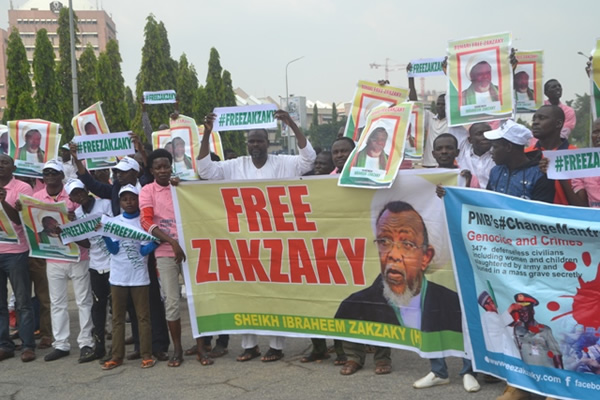(ABNA24.com) Dayo Apata, Nigeria's solicitor general, confirmed on Saturday that a federal court allowed the government to proscribe the Shia group as such, a move offering the authorities the chance to clamp down harder on the group.
IMN members have been marching in the capital Abuja and other cities for months calling for the release of their leader, Sheikh Ibrahim al-Zakzaky, who has been in detention since 2015 despite a court order to release him.
Zakzaky's office said plans to ban the movement had been considered since 2015 and it was not surprised by the move, Al Jazeera reported.
The protests have been peaceful but police and security forces have often violently attacked the protesters killing many of them. The IMN said at least 20 of its members were killed this week during a series of protests in Abuja. No official death toll has been released by police.
Security was stepped up across the country in the face of the ongoing protests.
The latest round of protests and the ensuing deadly crackdown has raised concerns, with rights groups calling for an investigation into the killings.
"The Nigerian police's apparent rush to use firearms against Shia movement protesters is unlawful and counterproductive," said Anietie Ewang, Nigeria researcher at Human Rights Watch, in a statement on Wednesday.
"The authorities should bring an end to their violent crackdown on the Shia Islamic Movement in Nigeria, and investigate the excessive use of force by the police," she added.
The group, which represents Nigeria's minority Shia Muslims, says it will continue protesting until it secures the release of Zakzaky, an Islamic scholar who founded IMN in the late 1970s.
Zakzaky has been in detention since December 2015 after his residence in the city of Zaria was raided by Nigeria’s forces, during which he was beaten and lost vision in his left eye.
During the brutal arrest, three of his sons were also killed, his wife sustained serious wounds, and more than 300 of his followers were killed.
Zakzaky was charged in April 2018 with murder, culpable homicide, unlawful assembly, disruption of public peace, and other accusations. He has pleaded not guilty, vehemently rejecting all accusations brought up against him.
Recent reports said that his health has been deteriorating, but prison authorities have prevented him from getting much-needed treatment.
Earlier this month, Zakzaky's son said after visiting him that he had been shocked by his father’s worsening medical condition, stressing that he needed to be immediately hospitalized as “large and dangerous quantities of lead and cadmium have been found in his blood.”
He added that Nigerian authorities had not taken any action so far and that they intended to murder his father.
In 2016, Nigeria’s federal high court ordered Zakzaky’s unconditional release from jail following a trial, but the government has so far refused to set him free.
/129

